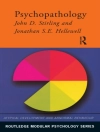Robert Ornstein and Paul Ehrlich explain that we are causing our own problems because we have created a world where our basic mental functions are no longer suitable. We evolved over a period of millions of years to survive in small tribal families on the wild grassy plains of East Africa. Now the way we live has nothing to do with that time and place, but the mental tools that were developed to survive on the savanna have remained unchanged. These instincts were wonderfully adapted to the environment that shaped them. But that world, the world that made us, is gone. Now these same instincts are causing us to destroy the world that we made. The threats we face are of our own making, and we can unmake them. If people learn how we have come to this point, we can restore our hope for the future. New World New Mind describes the way our minds have evolved, and offers suggestions for how to cope with who we are in the world we live in now. Recent decades have seen remarkable progress in many areas. For example, despite the abject suffering of millions of people, it is nonetheless true that there has been unprecedented alleviation of poverty and disease for the world’s poorest people. There are so many promising and astonishing advances in medicine, technology, and the social and physical sciences that if we give ourselves a chance to survive, our species could enter a golden age.
Cuprins
CHAPTER I
The Threat Within the Triumph
SECTION I
THE WORLD THAT MADE US AND THE WORLD WE MADE
CHAPTER 2
The World That Made Us
CHAPTER 3
The World We Made
SECTION 2
THE MATCHED AND THE MISMATCHED MIND
CHAPTER 4
Caricatures of Reality: How the Mind Is Mismatched
CHAPTER 5
Where Defaults Harm: Daily Life Decisions
CHAPTER 6
Outgrowing the Truth Fairy: Medico-, Psycho-, and Mystico-Therapies
CHAPTER 7
Managing a World Long Gone: The Old Mind in
Politics, the Environment, and War
SECTION 3
NEW WORLD NEW MIND
CHAPTER 8
The Beginnings of Real Change
CHAPTER 9
A Curriculum About Humanity
CHAPTER 10
Changing the World Around Us
APPENDIX
Notes and Sources
INDEX
Despre autor
Paul R. Ehrlich is Bing Professor Emeritus of Population Studies in the Department of Biology of Stanford University, and is president of Stanford’s Center for Conservation Biology.












